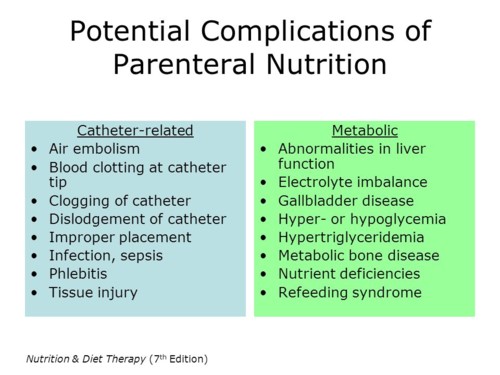While caring for a client receiving total parenteral nutrition (TPN), it is most important for the nurse to monitor which of the client's lab values?
Urinary ketones.
Serum protein.
Serum osmolarity.
Capillary glucose.
The Correct Answer is D
Correct answer: D
Choice A
Urinary ketones are not most important. Monitoring urinary ketones can provide information about the utilization of glucose and fat as energy sources. However, it is not the primary lab value to monitor in TPN administration.
Choice B
Serum protein is not most important. Monitoring serum protein levels is important to assess nutritional status, but it might not be as immediate a concern as serum osmolarity.
Choice C
Serum osmolarity reflects the concentration of particles (such as electrolytes, glucose, and other solutes) in the blood. Monitoring serum osmolarity is important to prevent complications related to fluid and electrolyte imbalances that can arise from the administration of TPN. Blood glucose levels (option D) are more critical because TPN can significantly impact glucose metabolism
Choice D
When caring for a client receiving total parenteral nutrition (TPN), the nurse’s priority is to monitor blood glucose levels. TPN can affect blood glucose, and observing for signs of hyperglycemia or hypoglycemia is crucial. Additionally, administering insulin as directed based on blood glucose levels is essential.

Nursing Test Bank
Naxlex Comprehensive Predictor Exams
Related Questions
Correct Answer is A
Explanation
Choice A
Serum HDL (high-density lipoprotein) of 35 mg/dL (0.91 mmol/L). Among the options provided, a serum HDL level of 35 mg/dL (0.91 mmol/L) is the assessment data that indicates the need for referral to a nutritionist. HDL is often referred to as "good" cholesterol because it helps remove excess cholesterol from the bloodstream, reducing the risk of cardiovascular disease. In this case, the HDL level of 35 mg/dL is below the recommended reference range for females (greater than 55 mg/dL or greater than 0.91 mmol/L), which could suggest a potential need for dietary and lifestyle interventions to improve cardiovascular health.
Choice B
Serum HbA1c (glycosylated haemoglobin) of 4.8% (0.05) is incorrect. This HbA1c level is within the normal reference range (4% to 5.9%) and indicates good blood sugar control.
Choice C
BMI (body mass index) of 22 kg/m² is incorrect. A BMI of 22 is within the normal weight range and might not necessarily indicate the need for a nutritionist referral.
Choice D
Total serum calcium of 10 mg/dL (2.5 mmol/L) is incorrect. This calcium level is within the normal reference range and might not require a nutritionist referral, unless there are other specific concerns related to calcium intake.
Correct Answer is C
Explanation
Choice A
Providing pamphlets about heart-healthy diet selections should not be implemented. Providing information is important, but it might not be as effective if the client is strongly resistant. Engaging in a conversation first can help tailor the information to the client's needs.
Choice B
Referring the client to a dietitian for nutrition education should not be implemented. A dietitian can provide valuable education, but it might be more beneficial to address the client's concerns and resistance before making the referral.
Choice C
Discussing client's concerns about the change in diet should be implemented. When a client is resistant or unwilling to make changes to their diet and lifestyle, it's important for the nurse to engage in open and empathetic communication. Option C, discussing the client's concerns about the change in diet, is the most appropriate initial response.
By engaging in a conversation with the client, the nurse can better understand the client's perspective, reasons for resistance, and potential barriers to making dietary changes. This approach allows the nurse to address the client's concerns, provide information, and work collaboratively to find solutions that might be more acceptable to the client.
Choice D
Suggesting exercise as an alternative to increase HDL levels should not be implemented. Exercise is important for heart health, but it's important to address the client's resistance to dietary changes first. Additionally, dietary changes and exercise can work together to improve overall heart health.
Whether you are a student looking to ace your exams or a practicing nurse seeking to enhance your expertise , our nursing education contents will empower you with the confidence and competence to make a difference in the lives of patients and become a respected leader in the healthcare field.
Visit Naxlex, invest in your future and unlock endless possibilities with our unparalleled nursing education contents today
Report Wrong Answer on the Current Question
Do you disagree with the answer? If yes, what is your expected answer? Explain.
Kindly be descriptive with the issue you are facing.
